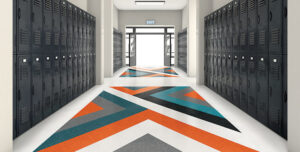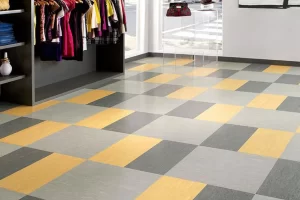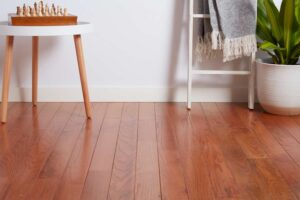Are you searching for the toughest floor material? Look no further, as we’ve got all the information you need.
Which flooring option can withstand the test of time while still maintaining its durability? From hardwood and ceramic tiles to concrete and vinyl, we’ve explored them all.
In this article, we’ll delve into the details of each material, uncovering their strengths and weaknesses.
So, join us as we uncover the secrets behind the toughest floor material out there.
Key Takeaways What Is the Toughest Floor Material
- Hardwood flooring, ceramic tiles, concrete flooring, and natural stone flooring are all considered to be the toughest floor materials.
- These materials are exceptionally durable and can withstand heavy foot traffic without showing signs of wear and tear.
- They are resistant to scratches and stains, making them suitable for high-traffic areas.
- Additionally, they require minimal maintenance and can last for decades or even centuries with proper care.
Hardwood Flooring
If you’re looking for a durable and timeless option, hardwood flooring is the way to go. Hardwood is known for its exceptional durability, making it a popular choice among homeowners. It can withstand heavy foot traffic, scratches, and even pet claws without losing its charm. The natural strength of hardwood comes from its solid composition and tight grain pattern.

Additionally, with proper care and maintenance, hardwood floors can last for decades or even centuries.
While the initial cost of installing hardwood flooring may be higher compared to other options like laminate or vinyl, it is important to consider the long-term benefits. Unlike these alternatives that may need replacement after several years, hardwood floors are an investment that adds value to your home. Moreover, the timeless beauty of hardwood never goes out of style and can easily be refinished if needed.
Ceramic Tiles
Ceramic tiles are known for their durability and low maintenance requirements. They are a popular choice for floors due to their ability to withstand heavy foot traffic and resist wear and tear. Here are some key reasons why ceramic tiles are so durable and easy to maintain:

- Strength: Ceramic tiles are made from a mixture of clay, minerals, and water that is fired at high temperatures. This process creates a strong and dense tile that can withstand impact without cracking or breaking.
- Resistance to stains: Ceramic tiles have a glazed surface that makes them resistant to stains caused by spills or dirt. This makes cleaning up messes quick and easy.
- Water resistance: Ceramic tiles are naturally waterproof, making them an ideal choice for bathrooms, kitchens, or any other areas prone to moisture.
- Low maintenance: Unlike other flooring options, ceramic tiles require minimal upkeep. Regular sweeping or vacuuming, along with occasional mopping with a mild detergent solution, is usually sufficient to keep them looking clean and new.
Overall, the durability of ceramic tiles combined with their low maintenance requirements make them an excellent choice for any space in your home or office.
Concrete Flooring
When choosing flooring options, you may want to consider concrete for its durability and versatility. Concrete floors are known for their strength and resilience, making them ideal for high-traffic areas such as garages, warehouses, and commercial spaces. Additionally, concrete can be finished in various ways to create a polished and stylish look. Let’s take a look at the pros and cons of concrete flooring:

| Pros | Cons |
|---|---|
| Durable | Cold surface |
| Low maintenance | Prone to cracking |
| Versatile design options | Hard on feet |
| Cost-effective | Susceptible to stains |
| Eco-friendly | Requires professional installation |
Concrete floor finishes can range from simple staining or etching to more elaborate techniques like stamping or stenciling. These finishes allow homeowners to customize their floors according to their desired aesthetic. However, it’s important to note that concrete floors can be cold underfoot and prone to cracking if not properly installed or maintained. Despite these drawbacks, concrete flooring remains a popular choice due to its long-lasting nature and ability to withstand heavy use.
Word count: 124 words
Vinyl Flooring
When it comes to vinyl flooring, durability is one of its key features.
Vinyl floors are known for their ability to withstand heavy foot traffic, making them a popular choice for high-traffic areas in homes and commercial spaces.
Additionally, vinyl flooring requires minimal maintenance, making it an attractive option for busy individuals or families who want a low-maintenance floor without compromising on style or durability.
Durability of Vinyl
Vinyl floors are known for their durability and resilience. They are a popular choice for homeowners due to their ability to withstand heavy foot traffic and resist scratches and stains. Here are some maintenance tips for vinyl flooring that can help prolong its lifespan:
- Regular sweeping or vacuuming: Removing dirt and debris from the surface helps prevent scratches and damage.
- Wipe up spills immediately: Vinyl is water-resistant, but prolonged exposure to liquids can still cause damage, so it’s important to clean up any spills promptly.
- Avoid harsh chemicals: Harsh cleaning agents can strip away the protective layer of your vinyl floor, so it’s best to use mild cleaners specifically designed for vinyl.
- Use furniture protectors: Place felt pads or coasters under furniture legs to prevent them from scratching or denting the vinyl.
In terms of cost, vinyl flooring is generally more affordable compared to other flooring options like hardwood or tile. It offers great value for money without compromising on style and durability.
Maintenance Requirements for Vinyl
Regular maintenance is essential for keeping your vinyl floors looking their best and prolonging their lifespan. After the vinyl flooring installation, it’s important to establish a cleaning routine to maintain its beauty and durability.
One of the benefits of vinyl flooring is its low maintenance requirements compared to other flooring options. To start, sweep or vacuum regularly to remove dirt and debris that can scratch the surface. For spills and stains, clean them immediately with a damp cloth or mop using a mild cleaner specifically designed for vinyl floors. Avoid harsh chemicals or abrasive scrubbers as they can damage the protective layer of the floor.
Additionally, placing doormats at entrances will help prevent dirt from being tracked onto the floor, reducing the need for frequent cleaning.
Laminate Flooring
If you want a durable and low-maintenance flooring option, laminate is a great choice. Laminate flooring is known for its exceptional durability, making it perfect for high-traffic areas in your home or office. Here are four reasons why laminate is a fantastic flooring material:
- Scratch and stain resistance: Laminate floors have a tough outer layer that protects against scratches and stains, ensuring that your floor will look pristine for years to come.
- Easy to clean: Unlike other flooring options, laminate requires minimal maintenance. Regular sweeping and occasional mopping are all it takes to keep your floors looking their best.
- Resilient against moisture: Laminate has excellent moisture resistance properties, making it suitable for kitchens, bathrooms, and basements.
- Long-lasting: With proper care, laminate floors can last up to 20 years or more.
Now let’s move on to natural stone flooring…
Natural Stone Flooring
When it comes to natural stone flooring, you’ll love the timeless beauty and unique character it brings to your space. Natural stone is known for its exceptional durability, making it a popular choice for high-traffic areas in homes and commercial spaces. Whether you choose marble, granite, limestone, or travertine, these stones are incredibly strong and resistant to wear and tear. With proper care and maintenance, natural stone floors can last a lifetime.
Maintenance requirements for natural stone vary depending on the type of stone you have chosen. Regular cleaning is essential to preserve its beauty and prevent any damage. It is important to avoid using harsh chemicals or abrasive cleaners that can scratch or etch the surface of the stone. Instead, opt for pH-neutral cleaners specifically designed for natural stone.
To keep your natural stone floors looking their best, be sure to sweep or vacuum regularly to remove dirt and debris that could cause scratches. Spills should be cleaned up immediately to prevent staining. Additionally, applying a sealant every few years will help protect the surface from stains and moisture.
Investing in natural stone flooring not only adds elegance but also ensures long-lasting durability with proper maintenance.
Engineered Wood Flooring
Natural stone flooring is undeniably strong and durable, but when it comes to toughness, engineered wood flooring also deserves recognition. Engineered wood is a popular choice for homeowners seeking the look of solid wood with added strength and stability.
Here are some benefits of engineered wood flooring:
- Versatility: Engineered wood can be installed in any room, including basements and areas with fluctuating humidity levels, where solid wood may not be suitable.
- Durability: The multiple layers of plywood or high-density fiberboard that make up engineered wood give it superior resistance to moisture and warping compared to solid wood.
- Cost-effectiveness: Engineered wood is generally more affordable than solid wood while still providing the aesthetic appeal and long-lasting performance.
- Eco-friendly: By using less real hardwood on the surface layer, engineered wood maximizes the use of natural resources.
Bamboo Flooring
When it comes to bamboo flooring, there are several key points that we need to discuss.
First, let’s talk about the durability of bamboo. Bamboo is known for its strength and resilience, making it a highly durable flooring option that can withstand heavy foot traffic and daily wear and tear.
Second, let’s delve into the environmental impact of bamboo. Unlike traditional hardwoods which take decades to grow and regenerate, bamboo is a rapidly renewable resource that can be harvested in just a few years without causing significant harm to the environment.
Durability of Bamboo
If you’re looking for a durable floor material, bamboo is a great option. Bamboo flooring has become increasingly popular due to its impressive durability and environmental benefits. Here are four reasons why bamboo is an excellent choice for those seeking a long-lasting and eco-friendly flooring solution:
- Hardness: Bamboo is known for its exceptional hardness, making it resistant to scratches and dents. In fact, it rivals hardwoods like oak and maple in terms of durability.
- Stability: Bamboo flooring is less prone to expansion and contraction caused by changes in temperature and humidity compared to other types of wood flooring. This stability ensures that your bamboo floor will maintain its integrity over time.
- Wear Resistance: Bamboo’s natural wear resistance allows it to withstand heavy foot traffic without showing signs of wear and tear.
- Sustainable Material: Unlike traditional hardwoods, which can take decades to grow back, bamboo reaches maturity within 5-7 years. This rapid growth makes it a sustainable choice with minimal impact on the environment.
Overall, bamboo flooring offers exceptional durability while also being environmentally friendly—a winning combination for any homeowner or business owner looking for a long-lasting and eco-conscious flooring option.
Environmental Impact of Bamboo
Bamboo is not only durable, but it also offers numerous environmental benefits, making it an excellent choice for those looking to minimize their ecological footprint.
As a renewable resource, bamboo grows much faster than traditional hardwoods, reaching maturity in just three to five years. This rapid growth means that bamboo can be harvested without causing deforestation or habitat destruction. Additionally, bamboo requires no pesticides or fertilizers to thrive, further reducing its impact on the environment.
Furthermore, bamboo releases more oxygen into the atmosphere and absorbs more carbon dioxide compared to other plants. Its extensive root system helps prevent soil erosion and promotes water conservation. With these environmental advantages in mind, maintaining bamboo floors becomes even more crucial.
Transitioning now to the next section about maintenance for bamboo…
Maintenance for Bamboo
Taking care of bamboo requires regular cleaning and proper maintenance techniques to ensure its longevity. Here are some tips for maintaining your bamboo flooring:
- Clean regularly: Sweep or vacuum the floor on a daily basis to remove dust and dirt particles that can cause scratches.
- Avoid moisture: Bamboo is susceptible to water damage, so clean up spills immediately and use a damp mop instead of soaking the floor.
- Protect from furniture: Use felt pads under furniture legs to prevent scratches and dents when moving or rearranging items.
- Refinish when needed: Over time, bamboo floors may show signs of wear. Consider refinishing the surface every few years to restore its appearance.
Bamboo floor installation offers many benefits, such as durability and eco-friendliness, but it also has its drawbacks. Understanding the pros and cons of bamboo flooring will help you make an informed decision before installing it in your home.
Transitioning into the next section about carpet tiles, let’s explore another popular flooring option.
Carpet Tiles
Carpet tiles are a popular choice for their ease of installation and versatility. The process is straightforward and can be completed by anyone with basic DIY skills.
First, ensure that the subfloor is clean, dry, and level. Lay down a tackless strip around the perimeter of the room.
Next, start placing the carpet tiles from one corner of the room and work your way across in rows. The adhesive backing on each tile makes it easy to secure them in place without any additional glue or tape.
One of the benefits of carpet tiles is their versatility. They come in a wide range of colors, patterns, and textures, allowing you to create unique designs or mix and match for a personalized look. Moreover, if a tile gets damaged or stained, you can easily replace it without having to replace the entire carpet floor.
Carpet tiles are also great for high-traffic areas as they are durable and can withstand heavy use. They provide added insulation against noise and temperature fluctuations while offering comfort underfoot due to their cushioning properties.
Frequently Asked Questions
How Much Does It Cost to Install Hardwood Flooring?
When it comes to installing hardwood flooring, the cost can vary based on factors such as the type of wood and the size of the space. It’s important to do a cost comparison and consider the pros and cons before making a decision.
Can Ceramic Tiles Be Used in Outdoor Spaces?
Ceramic tiles are a popular choice for outdoor flooring options due to their durability and low maintenance. They can withstand harsh weather conditions, but be aware that they may crack under extreme temperatures.
What Is the Average Lifespan of Concrete Flooring?
The average lifespan of concrete flooring depends on various factors, such as maintenance and foot traffic. However, it is generally durable and can last for several decades. The cost of installation varies but using epoxy flooring offers benefits like enhanced durability and easy maintenance.
Does Vinyl Flooring Require Any Special Maintenance?
Vinyl flooring durability depends on the quality of the material and installation. Regular cleaning is essential to maintain its longevity. Using mild detergent and a damp mop, along with avoiding abrasive cleaners, will help preserve vinyl flooring for years to come.
Are Carpet Tiles Suitable for High-Traffic Areas?
Carpet tiles are a durable flooring option for high-traffic areas. They offer numerous benefits in commercial spaces, such as easy installation, flexibility in design, and the ability to replace individual tiles if damaged.
Conclusion
After exploring various floor materials, it’s clear that there is no definitive answer to what the toughest floor material is. Each option has its own unique strengths and weaknesses, making them suitable for different environments and preferences.
From the durability of hardwood and ceramic tiles to the versatility of vinyl and laminate flooring, there are plenty of choices available.
So, which tough floor material will you choose for your space? The decision ultimately depends on your specific needs and personal style.




